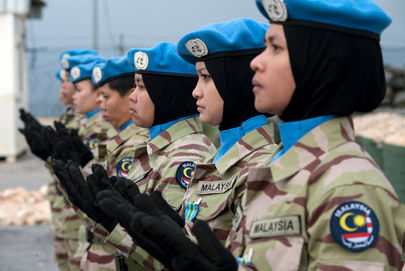Duality of Women’s Roles in Peacekeeping Efforts
- Ingrid von Kleydorff, WRN Intern
- Sep 6, 2017
- 3 min read

As the reach of conflict has expanded in the twenty-first century, there has also been a growing emphasis on how conflict has always been gendered. However, because men and women are impacted by conflict in different ways, women’s participation in conflict as well as peacebuilding must not be overlooked due to the influence it can have. India is slowly but surely growing its capacity to involve women in such efforts.
It is a common misconception that women are “essentially” peaceful because they maintain the roles of mothers, sisters, and daughters. However, it is dangerous to accept this stereotype at the risk of ignoring their positions as leaders, students, economists, politicians, athletes, soldiers, and more. Women are capable of peace more because of their dual roles in society rather than their nature. During times of conflict, women experience war crimes much differently from their male counterparts. Women are more often the victims of sexual violence. Furthermore, their familial roles become heavily depended on as the males of the household leave for combat. During times of non-conflict, these experiences become crucial for peacebuilding efforts as women are able to better understand the options for sustainable peace. Many countries in the midst of conflict, during times of turmoil, or even in the context of non-conflict, would benefit from recognizing the dual roles of women. Rather than denying women participation in the military or ignoring their voices in peace negotiations, governments will find that women’s experiences in conflict provide new windows for long-lasting peace.
While promises to increase women’s participation in peacebuilding and conflict efforts may be in order, accountability is also crucial to ensure sustainable peace and gender equality. Making this commitment opposes the stereotype that women are “essentially” peaceful by recognizing the impact of sexual violence on women in conflict, by providing them with avenues for participation, and empowering them in and out of conflict rather than silencing them. Using these experiences as a mobilization for change enhances the roles of women in the civil society sector.
On May 15, Indian diplomat, Tanmaya Lal, argued for an increase of women’s participation in peacebuilding and peacekeeping missions. Recently, India has increased its capacity for female participation in peacekeeping operations with a commitment to an all-female police unit and 15% of women participants in the military by the end of 2017. This encourages women’s empowerment in building the influence of their country while also emboldening them to participate in peacebuilding efforts, such as UN peace operations. By accepting the duality of women’s roles in conflict and peace efforts, the ability for women’s equality grows. Additionally, India has committed itself to increasing the prosecution of perpetrators of sexual violence against women in times of conflict. India has recognized the critical responsibility that women hold in post-conflict situations and is making an effort to include these thoughts in future peacebuilding efforts. If the Indian government follows through on its promise, women will have the ability to use their experiences in and out of conflict to hold the same government accountable by breaking down stereotypes and social barriers previously present in the society. Support at the national level must remain sustained and trustworthy to avoid corruption and ensure future equality.
Committing to support women’s familiarities in a variety of contexts will broaden the impact of these societies in times of peace and in times of unrest. Women understand the pain of losing loved ones, the implications of sexual violence, and the other side of conflict thus, they become encouraged to fight for armistice as activists. However, many women also use these experiences to fight for their countries as combatants. When peace terms are being reached, women are able to draw upon these experiences to understand how certain actions can aid families and marginalized communities to ensure that the peace is as far-reaching as possible. As organizations and committees such as UN Women and peacekeeping missions develop, governments must also develop to accept women’s experiences in both conflict and peace.
Ingrid von Kleydorff is an undergraduate student at the University of Denver studying International Studies and Spanish and is the Organizational Development and Research Intern at WRN.

































Comentarios